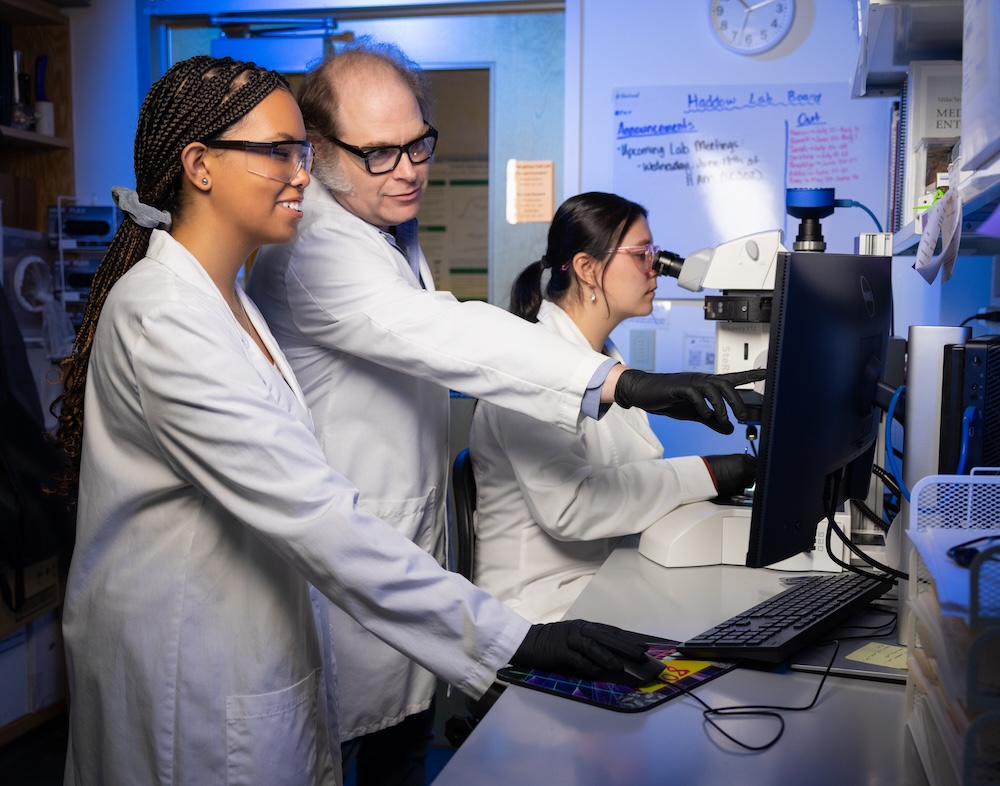

KENNESAW, Ga. | Aug 27, 2025

The assistant professor of microbiology said it’s all in service to his students, a color-coded guide to map success in the classroom, and as a researcher.
“We have what I call ‘do-outs,’ which helps them track their projects, and then we cross things off the list together,” Haddow said. “They sit in my office, and we talk through everything, whether they’re applying for fellowships or working through their experiments – anything I can do to help students succeed.”
Haddow joined KSU in 2021 after serving as a senior scientist for General Dynamics based at the U.S. Army Medical Research Institute of Infectious Diseases (USAMRIID). Since then, his lab has become a hub of student success. Each year, it hosts several high-level undergraduate research projects, often serving as a springboard for students to continue toward graduate studies.
Case in point, recent biology graduates Rose Sofia and Sofia Cuenca Rojas will leverage their lab experience to pursue their master’s degrees, Sofia in biological sciences at Auburn University and Cuenca Rojas in entomology at the University of Florida.
Sofia credited Haddow with helping her develop as a lab researcher through experiments involving mosquitoes.
“Dr. Haddow purposely set up the lab so that grad students mentored us instead of him holding our hands, and that built up my independence,” she said. “Working with live animals was cool, and I liked researching something tangible. I could see the causes and effects with mosquitoes over time.”
Cuenca Rojas also benefitted from Haddow’s hands-on approach, which helped her identify her research focus. A lover of animals, she discovered an affinity for misunderstood insects and their environmental significance. Her studies used the lab’s containment room, where researchers can breed and keep mosquitoes.
“My work with Dr. Haddow exposed me to the interactions of mosquitoes with everything around them,” she said. “To truly get an understanding of these issues, you need to take into account all the ways mosquitoes interact with their environment.”
The past two years, the Haddow lab has also hosted Birla Carbon Scholars, a program in which 12 students receive stipends from India-based Birla Carbon to conduct summer research and present their findings the following semester. Each scholar spends their summer investigating a project with implications far beyond the walls of KSU’s College of Science and Mathematics. Last summer, Spring 2025 graduate Alex Sidorova researched the effects of temperature and environmental pollutants on mosquito populations. This summer, Brooklyn Galvan investigated how pollutants in different environments affect multiple species of mosquitoes as one of the Birla Carbon Scholars.
An environmental science student, Galvan came to the Haddow lab through the First-Year Scholars Program based in KSU’s Office of Undergraduate Research. After presenting research at the Spring 2024 Symposium of Student Scholars, she returned to the Haddow lab through the Sophomore Scholars program. Now, Galvan looks forward to field research after two years spent mostly in the lab.
Research has come to life for Galvan under the tutelage of Haddow. His impact is twofold, she said.
“First, he’s a very open person. You can tell he’s passionate about his research,” Galvan said. “Second, whenever he’s meeting with students, he always advocates for us to aim high. He goes above and beyond what you expect from a professor.”
Another lab veteran, Ashley Belinfante, was among the first undergraduate students to get involved in research through Haddow’s facility. A 2023 graduate with a bachelor’s degree in biology, Belinfante investigated the risk of potential mosquito-borne virus spillover events by collecting mosquitos and using vector species quantity and composition as a predictor for exposure to West Nile and La Crosse, a project through the Summer Undergraduate Research Program (SURP).
Belinfante now works at the U.S. Department of Agriculture in Ames, Iowa, investigating bacterial respiratory infections in swine and searching for treatments through a fellowship with Oak Ridge Institute for Science and Education (ORISE). The work with Haddow’s research group prepared her for the role with the USDA, but Haddow used his knowledge of government research fellowships to help her find an opportunity that gelled with her career goals.
“If I hadn't gone through his lab, I wouldn't have ended up where I am. He pointed me in the direction of this fellowship opportunity, as well as the grad school I'm going to,” she said. “So, I can definitely see how his direct involvement has shaped my early career. He speaks so highly of things. It makes you want to explore new options.”
In the fall, Belinfante will begin doctoral studies in molecular biology and biochemistry at the University of Texas Medical Branch in Galveston. She illustrates Haddow’s goal of setting up students for future success, from conducting research to finding the right place to apply those skills.
“I came to Kennesaw State because I want to make a difference and help students,” Haddow said. “We’ve had a lot of wins in our lab, and I get so much satisfaction from their success.”
– Story by Dave Shelles
Photo by Matt Yung
A leader in innovative teaching and learning, Kennesaw State University offers undergraduate, graduate, and doctoral degrees to its more than 51,000 students. Kennesaw State is a member of the University System of Georgia with 11 academic colleges. The university's vibrant campus culture, diverse population, strong global ties, and entrepreneurial spirit draw students from throughout the country and the world. Kennesaw State is a Carnegie-designated doctoral research institution (R2), placing it among an elite group of only 8 percent of U.S. colleges and universities with an R1 or R2 status. For more information, visit kennesaw.edu.